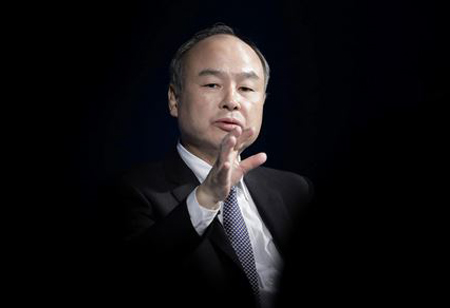
SoftBank's Masayoshi Son Foresees AI Running Entire Households


The founder of SoftBank Group Corp., Masayoshi Son, signaled an ambitious plan for a new wave in AI-driven innovation. In Masayoshi Son’s AI vision, the future looked excessively drawn toward AI in households and smart home technology. After a series of unfortunate events, the Japanese tech investment giant’s leader is back to strengthen the firm’s grip on artificial superintelligence. It was even reported that the assets of Softbank Vision Fund were sold to focus more on strategic investments in semiconductors and AI. Son made his statements clear that the goals will be directed toward the development of AI.
Reports claimed that Son appeared to be livelier and more optimistic compared to the years before. He had this idea of a future with robots and big data centers powered by Arm Holdings-designed chips, helping aid the fight with diseases, clean houses and even keep children entertained. This time it was also observed that the leader’s talks were emanating with a strong need to make a difference in the world, rather than being overcome with emotions, as compared to the past. Furthermore, he spoke about how his conversations with his pal, Steve Jobs, would oftentimes move him to tears, having him underestimate his legacy compared to the former Apple Co-Founder.
In the Eyes of Masayoshi Son
During the annual summit for enterprise clients, Son spoke about AI taking a pivotal role in making reservations, helping with grocery shopping, keeping tabs on health, calling medical services, assessing the best investments, and even helping children with their school work.
He mainly stressed on artificial general intelligence making a breakthrough in about two or three years. He said this, noting its significance in the long-term objective of developers from OpenAI to Meta Platforms and Alphabet's Google.
Being the CEO of the largest tech investor in Japan, Son has already made his move by placing hundreds of wagers on startups and businesses creating AI-powered new products and services. The leader’s latest talks highlight his determination to continue spending billions of dollars on the field.
AI to Become a Pro in Handling Enquiries
He gave an example of OpenAI's most recent ChatGPT model, 01, speaking about its capacity to handle data in a way that resembles human reasoning.
He spoke about how it is crucial to develop AI in a manner that is able to communicate and reason with people.
He gave examples of performing complicated tasks like determining a service's cost or ensuring that the bath is full and at the user's preferred temperature at the appropriate moment.
He believes that the demand for additional connectivity and chips that use technology from SoftBank's Arm Holdings will grow further if AI is being developed in this line. SoftBank has already proven its stance to aid with the expansion of Japan's AI ecosystem while also making more investments in robots, data centers, and AI chips.
Back in 2022, Softbank introduced chip manufacturer's Grace and Hopper architectures. Soon after that, its telecom division became the first to acquire a stockpile of Nvidia graphics processing units and has since stated plans to construct data centers in both northern and central Japan.
Money Moves
Son was making a gamble this time and gave a heads-up to shareholders as well. He has announced plans to invest $100 billion in chips related to AI. The billionaire stated that SoftBank had little choice but to try, whether his next big project might end up being a huge success or a catastrophe.
For a long time, Son remained in the shadows in favor of chip unit Arm, after a series of numerous misfortunes. The Japanese tech investment giant is still recovering from hundreds of failing startups. Most of them are observed to be emerging, unlisted businesses, looking to Son’s advice on how to survive in the rapidly evolving tech sector.
Recovering from Numerous Loss
As a result of the increase in AI investments that have supported assets like Arm Holdings, SoftBank Group was able to report its second consecutive quarter of profitability. With the support of investment profits at the holding company and on derivative contracts, the Tokyo-based company's March quarter net income of 231.1 billion yen (US$1.5 billion) was higher than anticipated, compared to a net loss of 57.6 billion yen the previous year. SoftBank exceeded forecasts with a smaller net loss of 227.7 billion yen for the entire year.
Restoring Softbank’s Footing through AI and Semiconductors
By investing in AI and semiconductors, Son believes these efforts could maximize Arm's potential beyond mobile devices, and eventually restore Softbank’s position. The selling of the assets of Vision Fund, helped increase SoftBank's cash reserves up to 6.2 trillion yen by the end of March.
Recently, he has been reportedly directing SoftBank’s money into AI-related devices, often seen in acquiring majority holdings. For one, the Japanese investment group is allegedly negotiating the purchase of Graphcore, a British semiconductor startup.
Another one includes Softbank leading a US$1.05 billion fundraising round earlier this month for UK self-driving startup Wayve Technologies together with Nvidia and current sponsor Microsoft. The 2022 merger deal with the robotics warehouse automation company Symbotic and SoftBank’s blank-check company are said to be engaged in collaborating on projects at present. At the same time, Softbank is also battling the possibility of interest rate increases. In the March quarter, SoftBank recorded foreign currency borrowings of 982.2 billion yen.
Son’s latest statements on AI appeared to reflect a significant change in SoftBank's approach, which ranked among the tech investor's most ambitious and passionate declarations in recent years.
After a string of disappointing losses in its flagship Vision Fund years ago, Softbank is observed to have taken a more cautious stance this time. While it’s attempting to take advantage of the AI boom, its commitments have remained relatively small, given the sector's boom and its profile.

